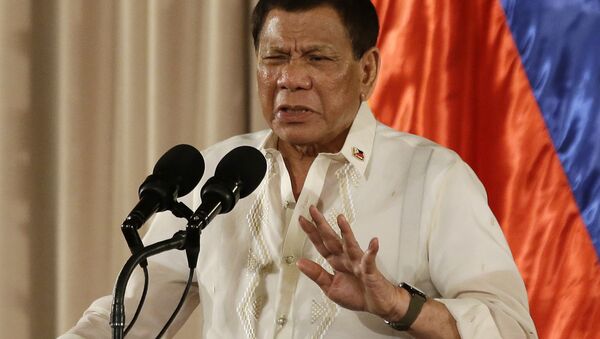Speaking behind bulletproof glass at the 1st Presidential Silent Drill Competition and ROTC Summit at the Quirino Grandstand in Manila on Friday, Duterte informed attendees that he feels neither scared nor threatened by the looming ICC investigation into his war on drugs.
“You do not scare me that you will jail me in the International Criminal Court. I will never allow myself to answer these whites,” the Philippines leader told military cadets and reservists, as reported by Reuters. “I will never, never, never answer any question coming from you. It’s bulls**t to me. I am only responsible to the Filipino. Filipinos will judge.”
“And if you hang me for all what I did, go ahead. It will be my pleasure,” he contended, driving his point home.
The 74-year-old’s comments on December 20 echo the sentiment of previous remarks he made about the United Nations Human Rights Council in July.
"I will not answer a Caucasian, you must be stupid. Who are you? I am a Filipino. We have our courts here,” Duterte said following the council’s adoption of a resolution which called for an investigation into his alleged human rights violations. He went on to say, as he did Friday, that he would only be prosecuted by a Philippine court and expressed that “maybe they can reimpose the death penalty, [so I can] die on Filipino land.”
Duterte and his government have been accused of thousands of extrajudicial killings during his war on drugs campaign. It’s estimated that some 7,000 individuals have been killed since Duterte’s anti-drug crackdown began in 2016, according to Reuters.
Duterte, who has been critical of the ICC for some time, announced his intent to withdraw the Philippines from the court in March of this year. While the ICC can only try members, the body’s regulations note that the withdrawal process takes at least 12 months to complete.
More recently, ICC Prosecutor Fatou Bensouda announced on December 5 that officials "will aim to finalize the preliminary examination" in 2020 “in order to enable the Prosecutor to reach a decision on whether to seek authorization to open an investigation into the situation in the Philippines."


